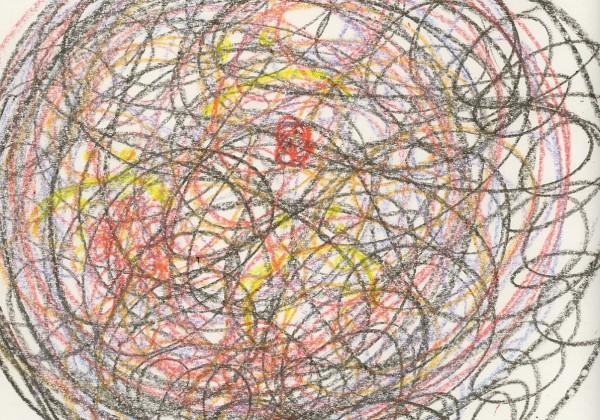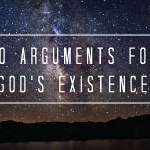Confusing the Arguments for God
by Douglas Beaumont
Filed under The Existence of God
In this article I wish to offer some clarification on different categories of arguments for the existence of God. I am not weighing in on the relative value any of them here. Rather, I am just pointing out some distinctions and categories that are often confused or missed at the popular level. Also, due to non-standard nomenclature, specific argument titles are not as important as the actual arguments. Regardless of labels, it is important to keep these distinctions in mind when arguing toward various conclusions. As will be shown below, confusing them can have very negative consequences.
Cosmological Arguments
Cosmological arguments proceed from the fact of existence of the cosmos to a creator. A key ingredient in the most popular cosmological argument (e.g., the kalam) is the idea that one must avoid an “infinite regress” (i.e., the supposition of an actual infinite quantity).
The main issue I’ve seen here is that many people (e.g., Richard Dawkins) take their understanding of one issue with infinite regresses and then import it into some contingency forms of the argument, like the one crafted from the writings of Thomas Aquinas. The problem is that Aquinas denied the validity of arguing for the beginning of the universe based on an infinite regress, thus he clearly was not supposing such a thing in either the Five Ways or in On Being and Essence.
“Horizontal” (Kalam) Cosmological Argumentation
The basic form of the “horizontal” or kalam cosmological argument is as follows:
- Everything that begins to exist has a cause of its existence.
- The universe began to exist.
- Therefore the universe has a cause of its existence.
The heart and soul of the kalam argument lies in the impossibility of an infinite regression of temporal events. An actual infinite is a set which contains an infinite number of members, the potential infinite, on the other hand, is an ever-increasing set formed by successive addition. Only the potential infinite has, or can have, real existence, for an actual infinite number of things cannot exist (“infinite number” ultimately being a contradiction). So, if the universe had no beginning, then the number of moments before today would be an actually infinite amount of moments. But there cannot be an actually infinite amount of moments, so the universe must have begun and was caused to begin by something outside the universe.
“Vertical” (Contingency) Cosmological Argument
The “vertical” or contingency argument comes from the work of Thomas Aquinas. Its form is radically different from the "horizontal" argument:
- A contingent being (i.e., a being that exists but can not-exist) exists.
- This contingent being must have a cause of its existence that is something other than the contingent being itself, and an infinite number of additional contingent beings cannot provide an adequate causal account for the existence of a contingent being.
- Therefore, a necessary being (a being that cannot not-exist) exists.
The key issue in premise 2 is that multiple, even infinite, contingent beings cannot ultimately explain the existence of the being we started with. This is not, however, because we cannot have an infinite number of something—it is because an infinite number of contingent beings would never ultimately account for itself (in the same way that positing an infinite number of train cars does not explain the motion of the first train car—there has to be an engine).
(Note: Other contingency arguments, such as Leibniz’s principle of sufficient reason, are usually not confused in the above manner and so are not restated here).
Design Arguments
These are probably the most confused arguments for God, and it happens all the time. The two main forms, the intelligent design and teleological, are often lumped together.
Intelligent Design Argumentation
Design arguments typically proceed from the identification of various patterns, information, or statistical anomalies to God’s existence as the best explanation for these features. Intelligent design arguments are usually of the form:
- The universe (or something in it) exhibits some property that is evidence of design (e.g., information, improbability, hospitality to life).
- Design is always thought to be caused by some intelligence.
- Therefore, the best explanation for the property is that there exists an intelligent designer who intentionally brought it about.
There are both micro and macro versions of Intelligent Design arguments, some from things smaller than humans (DNA, bacteria, etc.) and some larger (atmosphere, galaxies, etc.). To the extent any of these things are shown to have some kind of design, they are used as evidence of having a intelligent cause. Generally speaking, God is considered that cause.
Teleological Argumentation
“Telos” comes from the Greek word for “ends or goal.” A true teleological argument, therefore, looks forpurposefulness in creation—not simply statistically-improbable states, information codes, or irreducibly complex systems. Aquinas’s argument, for example, relies specifically on the explanation for goal or end-directed natures, activities, or properties found in creation. Goal-directed systems can only be accounted for by the existence of an intelligent being who directs that system.
Further, since all created things seem to operate according to some goal (even goals that are not their own, such as those of rocks and protons), the entire universe can be explained only by the existence of an intelligent being beyond creation.
Moral Arguments
There are many version of the moral argument that are often confused as well. Two of the most common versions concern the Moral Law and the Natural Law:
Moral Law Argumentation
The moral law argument is often said to be taken from Romans 2 and was famously used by C. S. Lewis in Mere Christianity. It usually goes something like this:
- All people recognize that some things are right, and some things are wrong, which requires a standard or law against which things can be judged.
- Standards and laws requires a lawgiver, or something to ground this law.
- This universal law requires a lawgiver.
The key here is that moral intuition seems to be built into humans. Because the Moral Law transcends known creation (humanity being at the “top”, so to speak), this universal law requires a lawgiver that transcends known creation (i.e., God). This, unfortunately, is where the confusion comes in. It is one thing to try to ground morality in God—it is another to explain how we know this moral law. At this point many people confuse the moral law argument with natural law.
Natural Law Argumentation
The term “Natural Law” is sometimes used as equivalent to the “laws of nature,” (i.e., the order which governs the material universe). In these cases, the “law” is really more of a description of what things are—not necessarily how they should be. Thus, it could refer to rocks falling, plants photosynthesizing, animals sleeping, etc. Natural law arguments, then, proceed from the existence and knowability the nature of things (what they are—not what they do) to moral laws based on those natures:
- X is a certain kind of thing.
- Action Y is a good for the flourishing of X.
- Therefore, Y is moral action for X to perform, and ~Y is bad for X.
Natural laws are derived from observations and experience of things in the world around us. By knowing what something is and what its purpose is, we can objectively determine what is good or bad for it. Thus, it works whether or not natural laws are expanded upon—or explicated by—some deity (for more on this see Dr. Edward Feser’s article). That is why the Natural Law is not the Moral Law “written on the heart” by God, nor part of Divine Command Theory, nor equivalent to God’s group-specific covenental laws. And it is not part of the Moral Law Argument given above. Technically, a non-human alien could observe humanity from another planet and discover natural human moral principles without partaking in humanity’s moral code at all.
Presuppositional Arguments
Presuppositional apologists sometimes confuse what they call “the transcendental argument” (that without Christianity, nothing else in reality can be adequately explained) with grounding arguments (aka demonstratio quia).
Transcendental Argumentation
To reason “transcendentally," in this context, is to argue that “X is actually necessary to deny X, therefore X must be the case.” Presuppositional apologists often give the example of logic as being transcendentally necessary, because one must employ logic to deny logic. Since it would be self-defeating to use logic to show that logic cannot be used, the denial of logic can be transcendentally disproved.
Grounding Argumentation
The demonstratio quia ("argument to ground") is similar in that it uses the necessity of one thing in its argument. Unlike transcendental arguments, however, grounding arguments proceed from the existence of some effect to a necessary condition for that effect. The form would be something like this: “X is necessary for Y, so if one denies X, one must also deny Y.”
The key to these differences is that while logic is required to deny logic, morality is not necessary to deny morality. Logic, then, is shown to be transcendentally necessary while God, in the Moral Argument, is not (it is actually a grounding argument: “For morality to exist, God must exist, and morality exists, therefore God exists.”).
The problem is that Presuppositionalists will sometimes give an example of a good transcendental argument, but then switch to grounding arguments in their actual apologetic—even when defending their own system. This confusion also leads some apologists into thinking that Presuppositionalism per se is much stronger and more distinct as an apologetic system than it really is.
Conclusion
While basic categories are useful when first learning a subject, eventually the distinctions that justify those categories can become very important. Once you become familiar with these arguments, it will help provoke fruitful dialogue if you get more precise as soon as possible. This is demonstrated by the story of the atheist daughter of a popular Christian apologist who lost her faith when she could not answer a theological question. As is clear from her recounting of her thinking, the question itself was based on her own confusion over natural law and God’s covenant commandments. Confusion about theses arguments, whether by Catholics or atheists, can have real and long-lasting effects.
Related Posts
Note: Our goal is to cultivate serious and respectful dialogue. While it's OK to disagree—even encouraged!—any snarky, offensive, or off-topic comments will be deleted. Before commenting please read the Commenting Rules and Tips. If you're having trouble commenting, read the Commenting Instructions.













